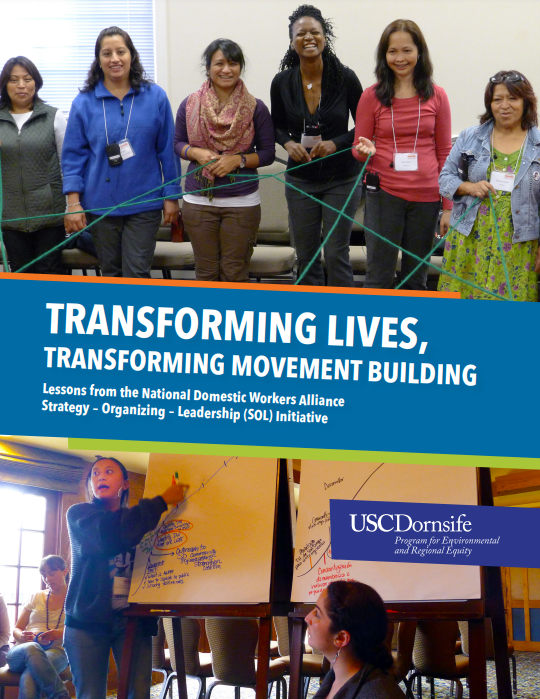
From 2008 to 2019, the USC Equity Research Institute (ERI) published reports under our previous name, the USC Program for Environmental and Regional Equity (PERE).
November/December 2014
By Jennifer Ito, Rachel Rosner, Vanessa Carter, and Manuel Pastor
Transforming Lives, Transforming Movement Building: Lessons from the National Domestic Workers Alliance Strategy – Organizing – Leadership (SOL) Initiative documents the impacts and lessons from a two-year transformative leadership and movement building program to strengthen the domestic worker movement.
In collaboration with trainers from generative somatics (gs) and Social Justice Leadership (SJL), the National Domestic Workers Alliance (NDWA) took a cohort of 60 domestic workers and organizers through an intentional process of transformation that integrated political somatics practices with leadership skills for organizing and building power.
In Transforming Lives, Transforming Movement Building, we document the observable and immediate markers of transformation among the cohort that reflect the kind of leadership needed to take bold steps forward, move constructively through conflicts towards transformative change, and address trauma and other barriers to social change—while also building healthy organizations and forwarding values of love and dignity to sustain the work and become a more powerful movement.
The report itself is the result of an iterative, co-creative process between PERE, NDWA, SJL, and gs—the sort of process we have called for when recommending a new model of assessment and evaluation. We hope that our collective attempt to translate this effort are useful to the movement-building field and philanthropic supporters given the historic openings for the recognition of domestic workers, the growth in organizing of low-wage and contingent workers in general, and the need for stronger, broad-based, grassroots movements nationally.
Download report
Related Resource
November 2014
Co-Creating Movement Metrics that Matter: Resources, Reflection and the Right Data
PERE Project Manager, Jennifer Ito, wrote an article for the National Committee for Responsive Philanthropy’s, Responsive Philanthropy newsletter. Her piece highlights lessons for the field (funders, evaluators, and movement builders alike) on the importance of co-creating metrics, and outlines key insights from PERE’s work with the National Domestic Workers Alliance’s SOL Initiative.
Success in organizing can be measured by a plethora of concrete examples: the number of residents who show up to a community meeting, the number of members who complete a leadership development training and the number of leaders who share their personal stories at a public hearing. But organizers will tell you that success also can be measured by more anecdotal evidence: the new relationships between neighbors when they realize they share the same concerns, the new perspectives they gain when they learn about the root causes of their problems and the influence over policy they have when they speak up collectively before a panel of decision-makers.




